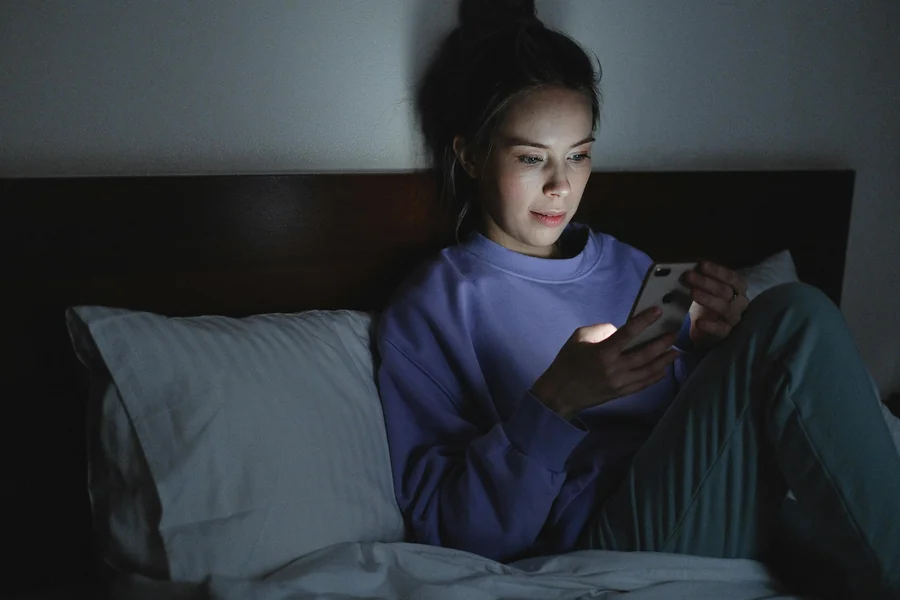Screen Time & Blue Light: Surprising Effects on Thyroid Hormones

Screens are part of nearly every routine today. Phones wake us up, laptops run our workdays, and TVs fill our evenings. Many people accept tired eyes or a restless night’s sleep as the main side effects of heavy screen use. Yet the truth runs deeper.
The real problem is that the blue light shining from these devices can upset hormone systems. One gland in particular, the thyroid, controls energy and metabolism. When its balance is disturbed, the entire body feels the strain. Recognizing this hidden connection shows why screen habits are about more than comfort.
This is even more relevant with social media. Apps like TikTok, Instagram, and Facebook encourage endless scrolling late into the night, keeping people locked into glowing screens at the exact time the body should be winding down. That habit is one of the strongest triggers for hormone disruption.
What Blue Light Does To Hormones
Blue light is a high-energy part of the visible spectrum. In natural daylight, it helps keep our body clock on track. The trouble begins when screens extend this exposure late into the night.
At night, blue light reduces melatonin, the hormone that signals it’s time to sleep. Over time, low melatonin disrupts the hypothalamic-pituitary-thyroid axis, the system that tells the thyroid when to release hormones. Shifts in this system may affect thyroid-stimulating hormone (TSH) and eventually disturb overall thyroid function.
Meet John Stacks, a provider committed to smarter, patient-centered health solutions. He highlights how daily screen habits may appear minor but gradually shift hormones in ways that matter. That late-night scroll may feel harmless, but it can quietly unsettle the thyroid’s balance.
Why The Thyroid Matters So Much
The thyroid is small, yet it drives many key processes. It regulates metabolism, controls body temperature, and sets the pace of digestion. When hormones are low, people may feel exhausted, gain weight, or struggle with dry skin and hair loss. When hormones are high, the opposite happens: restless energy, unplanned weight loss, and rapid heartbeat.
This is where the real concern lies. Daily screen exposure at night can disrupt hormone balance without obvious warning signs. Over months or years, the impact can accumulate. For students, professionals, and parents with long evening screen time, this means a modern routine could gradually weaken thyroid health.
What Research Suggests
Scientists are still studying the link, but early evidence raises important questions. Animal studies show that light at night changes hormone patterns, including TSH levels. Human research also connects irregular light exposure to disturbed sleep cycle and metabolic changes.
While more studies are needed, one message is clear: light strongly affects hormones. For most of history, people lived by the rise and set of the sun. Now, glowing devices bring daylight signals into the night. The thyroid and other hormones are caught in the middle of this shift.
Some researchers argue that the thyroid may be more sensitive than we once thought. Disruption to melatonin, cortisol, and thyroid hormones together creates a cycle that makes it harder for the body to maintain balance. Even moderate changes, when repeated over years, could explain rising concerns about fatigue, weight problems, and stress-related illness in today’s digital age.
Steps That Protect Thyroid Health
The solution is not to avoid screens entirely. Instead, it is about smarter routines that reduce late-night blue light. Here are practical steps:
- Reduce screen time before bed: Aim to power down at least an hour before sleep so melatonin can rise.
- Use night filters on devices: Most phones and laptops now have warmer settings that lower blue light levels.
- Get real daylight each morning: Exposure to sunlight early in the day helps reset the body’s clock.
- Take short breaks during the day: Looking away every 20 minutes eases strain on eyes and nerves.
- Keep bedrooms dark: A screen-free, quiet space makes it easier for hormones to follow their natural cycle.
- Set limits on social media at night: Turning off notifications or logging out of social media apps in the evening reduces both light exposure and mental stimulation, making it easier to fall asleep and protect hormone balance.
These changes work because they directly address the cause: too much artificial light at the wrong time. By protecting melatonin, you also protect the thyroid and other systems that depend on natural rhythms.
Consistency is key. One night of late scrolling may not do lasting harm, but weeks of the same pattern can build up. Small steps, repeated daily, protect not just the thyroid but overall health.
Why Awareness Is So Important
Most conversations about blue light stop at eye strain or sleep quality. That narrow focus misses the wider effect on hormones. Once people understand that the thyroid is also affected, the topic becomes much more serious.
Awareness matters for families with children who grow up on tablets, for professionals with long hours on laptops, and for anyone who finds themselves scrolling before bed. With more knowledge, people can act early to protect their health. Small adjustments today may prevent long-term thyroid concerns tomorrow.
It also matters for health providers, who can guide patients with advice that goes beyond sleep more or cut stress. When thyroid issues appear without a clear cause, light exposure may be part of the story worth discussing.
Building Better Habits For Balance
Screens are not the enemy; habits are. Technology brings value to work, learning, and connection, yet how and when we use it shapes our health. By reducing late-night exposure, applying device filters, and spending more time in natural light, we can keep hormones steady.
This is both the problem and the solution: blue light from screens can disturb thyroid hormones, yet daily adjustments help restore balance. Protecting the thyroid means protecting energy, mood, and metabolism. In today’s digital world, that balance is worth guarding.



